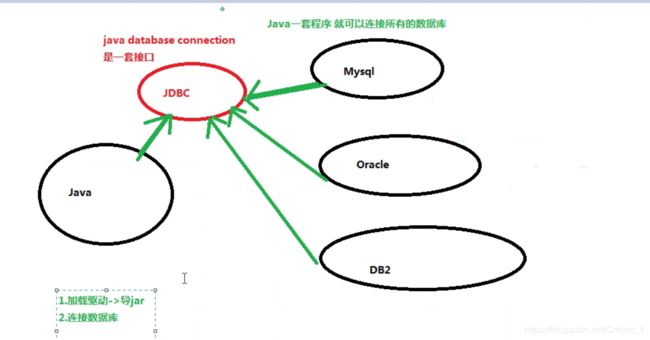Android JDBC简单使用
一,JDBC 简介
JDBC:java database connectivity java数据库连接
常用的数据库mysql oracle sqlserver
sun公司提供了一套jdbc的接口,让数据库厂商实现。
二,JDBC使用:
1,JDBC简单使用
步骤:
1),导入jar包
public class JDBCTest {
@Test
public void jdbcTest() {
try {
// [1]注册mysql驱动
//DriverManager.registerDriver(new Driver());
Class.forName("com.mysql.jdbc.Driver");
// [2]连接数据库
// jdbc:subprotocol:subname
// URL 固定格式: jdbc:数据库名字// localhost:3306/ lol (本地数据库地址),用户名,密码
Connection connection = DriverManager.getConnection(
"jdbc:mysql://localhost:3306/lol", "root", "1q2w3e");
// [3]创建一个statement对象 类似 库管
Statement statement = connection.createStatement();
// [4]执行查询语句
ResultSet resultSet = statement.executeQuery("select * from student");
resultSet.next();
String name = resultSet.getString(2);
System.out.println("name = "+name);
} catch (Exception e) {
// TODO Auto-generated catch block
e.printStackTrace();
}
}
}
2,JDBC类重要的方法:
【1】DriverManager:注册驱动 告诉当前程序 连接哪个数据库
DriverManager.registerDriver(new Driver());
Class.forName("com.mysql.jdbc.Driver");
获取连接 :“ DriverManager.getConnection("jdbc:mysql:///mydb1", "root", "1q2w3e");
【2】Connection: 连接数据库的对象
获取一个statement connection.createStatement()
获取一个preparedStatement
【3】Statement: 用来执行sql语句 是一个库管对象
接口 Statement:用于执行静态 SQL 语句并返回它所生成结果的对象。
方法:
executeQuery(String sql) 执行给定的 SQL 语句,该语句返回单个 ResultSet 对象。
【4】ResultSet: 结果集对象 里面有一个光标 默认在第一行之前 调用next方法 就可以向下移动
接口 ResultSet: 表示数据库结果集的数据表,通常通过执行查询数据库的语句生成。
方法:getString(String columnLabel) 以 Java 编程语言中 String 的形式获取此 ResultSet 对象的当前行中指定列的值。
executeUpdate(String sql) 执行给定 SQL 语句,该语句可能为 INSERT、UPDATE 或 DELETE 语句,或者不返回任何内容的 SQL 语句(如 SQL DDL 语句)。
为什么使用 Class.forName("com.mysql.jdbc.Driver");创建对象:
// 本身方法也是new Driver。我们用Class去调用免得重复创建对象 Driver 类里自己静态代码块进行加载了自己
3,JDBC简单调用增删改查:
public class JDBCSample {
@Test
public void add() {
//插入语句
try {
//注册驱动
Class.forName("com.mysql.jdbc.Driver");
//链接数据库
Connection connection = DriverManager.getConnection(
"jdbc:mysql://localhost:3306/lol", "root", "1q2w3e");
//申请对象类似于库管
Statement statement = connection.createStatement();
int result = statement
.executeUpdate("insert into student values(30,'zhaoyun',99,100)");
if (result > 0) {
System.out.println("插入成功");
} else {
System.out.println("插入失败");
}
} catch (Exception e) {
// TODO Auto-generated catch block
e.printStackTrace();
}
}
@Test
public void remove() {
//删除语句
try {
Class.forName("com.mysql.jdbc.Driver");
Connection connection = DriverManager.getConnection(
"jdbc:mysql://localhost:3306/lol", "root", "1q2w3e");
Statement statement = connection.createStatement();
int result = statement
.executeUpdate("delete from student where id > 20");
if (result > 0) {
System.out.println("删除成功" + result);
} else {
System.out.println("删除失败" + result);
}
} catch (Exception e) {
// TODO Auto-generated catch block
e.printStackTrace();
}
}
@Test
public void update() {
//更新语句
try {
Class.forName("com.mysql.jdbc.Driver");
Connection connection = DriverManager.getConnection(
"jdbc:mysql://localhost:3306/lol", "root", "1q2w3e");
Statement statement = connection.createStatement();
int result = statement
.executeUpdate("update student set english = 100 where id = 30");
if (result > 0) {
System.out.println("更新成功" + result);
} else {
System.out.println("更新失败" + result);
}
} catch (Exception e) {
// TODO Auto-generated catch block
e.printStackTrace();
}
}
@Test
public void query() {
//查询语句
try {
Class.forName("com.mysql.jdbc.Driver");
Connection connection = DriverManager.getConnection(
"jdbc:mysql://localhost:3306/lol", "root", "1q2w3e");
Statement statement = connection.createStatement();
ResultSet resultSet = statement
.executeQuery("select * from student");
while (resultSet.next()) {
String id = resultSet.getString(1);
String name = resultSet.getString(2);
String english = resultSet.getString(3);
String math = resultSet.getString(4);
System.out.println("id = "+id +" name = "+name + " english = "+english +" math = "+math);
}
} catch (Exception e) {
// TODO Auto-generated catch block
e.printStackTrace();
}
}
}
4,JDBC的封装:
[1]创建配置文件:db.properties 存放路径,帐号,密码。
className:com.mysql.jdbc.Driver
url:jdbc:mysql://localhost:3306/lol
name:root
pwd:1q2w3e
[2] 创建Utils getConnection获取对数据库的链接
public class JDBCUtils {
private static String className;
private static String url;
private static String name;
private static String pwd;
static {
try {
//保存本地配置
Properties properties = new Properties();
properties.load(new FileInputStream("db.properties"));
//获取properties 中的字段
className = properties.getProperty("className");
url = properties.getProperty("url");
name = properties.getProperty("name");
pwd = properties.getProperty("pwd");
} catch (Exception e) {
// TODO Auto-generated catch block
e.printStackTrace();
}
}
//获取
public static Connection getConnection() throws Exception {
Class.forName(className);
return DriverManager.getConnection(url, name, pwd);
}
}
[3] 写SQL语句
public class JDBCUtilsTest {
@Test
public void add() {
try {
Connection connection = JDBCUtils.getConnection();
Statement statement = connection.createStatement();
int result = statement.executeUpdate("insert into student values(30,'machao',99,99)");
System.out.println("result = "+result);
} catch (Exception e) {
// TODO Auto-generated catch block
e.printStackTrace();
};
}
@Test
public void remove() {
try {
Connection connection = JDBCUtils.getConnection();
Statement statement = connection.createStatement();
int result = statement.executeUpdate("delete from student where id = 30");
System.out.println("result = "+result);
} catch (Exception e) {
// TODO Auto-generated catch block
e.printStackTrace();
};
}
@Test
public void update() {
try {
Connection connection = JDBCUtils.getConnection();
Statement statement = connection.createStatement();
int result = statement.executeUpdate("update student set english = 100 where id =20");
System.out.println("result = "+result);
} catch (Exception e) {
// TODO Auto-generated catch block
e.printStackTrace();
};
}
@Test
public void query() {
try {
Connection connection = JDBCUtils.getConnection();
Statement statement = connection.createStatement();
ResultSet resultSet = statement.executeQuery("select * from student");
while(resultSet.next()){
String id = resultSet.getString(1);
String name = resultSet.getString(2);
String english = resultSet.getString(3);
String math = resultSet.getString(4);
System.out.println("id = "+id +" name = "+name + " english = "+english +" math = "+math);
}
} catch (Exception e) {
// TODO Auto-generated catch block
e.printStackTrace();
}
}
}
5,login登陆查询数据库
*BUG,预编译。占位符。进行编译转义。



